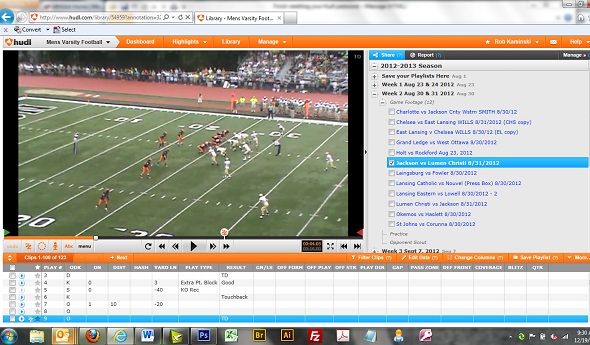
The Changing Face(book?) of Coaching
March 26, 2013
By Rob Kaminski
MHSAA benchmarks editor
From online video exchange programs such as hudl.com to social media platforms like Facebook, Twitter, and LinkedIn, the face of coaching and communicating with teams is ever-changing. How much is too much, and how are the new tools being used by the old guard?
With increasing frequency, today’s coaches are turning to technology to assist in their endeavors, particularly in video review and data compilation, as the number of programs available to them seems to grow on a daily basis.
Among the recent leaders, hudl.com seems to have won the favor of football coaches across the state, reducing video exchange and study to a couple clicks of the mouse.
Several members of the MHSAA Student Advisory Council report that their football coaches use the web-based program, and even local officials associations are using it for film study.
Similar programs are making it easier for today’s coaches to analyze data and compile statistics as well.
“The dispensing of information is much quicker than it used to be,” said Marshall bowling coach Sue Hutchings. “We use a scoring software for our stats.”
In more “visual” sports such as competitive cheer, online video is now essential.
“Video playback and feedback to athletes has helped the sport 10-fold,” said Middleville Thornapple-Kellogg coach Abby Kanitz.
In some cases, coaches are taking the lead on such initiatives.
“I run the MISCA (Michigan Interscholastic Swim Coaches Association) website and receive plenty of positive feedback about us posting meet results and top times reports,” said Bloomfield Hills Andover coach David Zulkiewski. “I also visit MHSAA.com weekly. Since I run the MISCA website, I want to make sure I have accurate and up-to-date information posted.”
Technology has also made the world a bit “greener” even in the small corner that is interscholastic athletics. From the required MHSAA rules meetings moving to an online format, to volumes of data now stored on flash drives rather than in file cabinets, coaches are realizing savings in both time and cost.
“The current state of track and field and cross country is so much more manageable than when I began,” said East Kentwood’s Dave Emeott. “I remember compiling actual papers from all over the state to keep track of the opposition, and now thanks to Athletic.net we have this access at the tip of our fingers. These programs have also replaced nights spent inputting data and record-keeping. I am sure I have replaced all that time elsewhere, but it is probably spent with kids and not with data.”
With the saturation and availability of these reports around the clock also comes temptation for those who are driven, and even obsessed, with such numbers. Coaches can rank near the top of that list.
“Technology can be extremely helpful and time-saving for coaches and teachers,” said Grand Haven wrestling coach James Richardson. “But, the disadvantage is the coaches and athletes have a more difficult time getting away from the sport, as we have access to so much information, and others have more access to us. This can lead to too much time being devoted to our sport.”
It also might even take some of the fun out of the actual competition.
“I think the one negative side of technology is the lack of the unknown,” Emeott said. “There was a day when we would enter a meet and not really know how the day would turn out. Now I have most meets scored within 10 points the day before we arrive.”
At times, such advance information also can lead to overconfidence heading into competition.
“Currently the MHSAA Final draw is posted online, and my players often see it and draw their own conclusions before I have a chance to talk to them about it,” said Allegan tennis coach Gary Ellis. “In the past, I was able to present their draw in the light in which I wanted them to see it.”
Another side effect is the indirect push to play beyond high school.
“There is a lot more social promotion and glamourizing of the athletes,” said Mike Van Antwerp, Holt lacrosse coach. “The recruiting pressure has increased tremendously, which is causing kids to commit earlier and go to great lengths to have a chance at being recruited.”
The world has indeed become a smaller, more familiar place. Not only can students and coaches learn pertinent statistics relating to any given opponent, they can also learn personal information about their competition through the deluge of social media vehicles.
It is in this realm where the greatest divide exists between coaches and their athletes when the subject of technology comes up.
Several members of the MHSAA Student Advisory Council indicate that their coaches do not use social media to assist with the daily activities involved with their sport, while others are but only on a limited basis.
It’s not that the coaches don’t know about Facebook, Twitter, LinkedIn, or the other platforms. More likely, they are all too well versed in the abuses of such mediums by young adults not yet ready to understand the lasting ramifications of a random tweet or damaging photo.
“We have specific rules for use of cell phones at practice, games, in the locker room, etc.,” said Diane Laffey, athletic director and coach at Warren Regina. “We also have a form for parents to sign if they want the coach to be able to text their daughter about practice or game cancellations or changes. We stress that the texting only be for necessary things, and the parents are to give permission.”
Safeguarding against the misuse of handheld devices is becoming as commonplace as handing out uniforms prior to the season.
“By rule, our players aren’t allowed to bring electronic devices to the court with them. We restrict cell phone usage at practice,” said Portage Central tennis coach Peter Militzer. “Players must ‘friend’ the coach on either Facebook or Twitter, and I monitor their activities to make sure their language and behavior meets our standards. We restricted a player’s opportunity to play on varsity last season due to excessive use of crude language and an offensive user name on Twitter.”
PHOTO: This is a screenshot from Hudl.com, an online service used by high school football coaches for video analysis and archiving.

MHSA(Q&)A: Stevensville-Lakeshore wrestling coach Bruce Bittenbender
February 9, 2012
Bruce Bittenbender grew up in Bethlehem, Pa., in the heart of steel country, and worked part-time in a mill as a young adult. That helped land him in Michigan City, Ind., not long after graduating from Milligan College in Tennessee in 1969.
But Bittenbender wanted to teach and coach.
Bittenbender took a teaching job at South Haven that fall, and as an assistant coach helped that school's wrestling team to the MHSAA Class B championship. A year later the wrestling coaching job opened at Stevensville Lakeshore. He says now that he was too young for the job, but Bittenbender applied and was hired. The program was struggling at that point -- but not for much longer.
According to the National Federation of State High School Associations' record book, Bittenbender trailed only Rex Peckinpaugh of New Castle, Ind., in career dual coaching wins heading into this season (796-780). Bittenbender won his 800th match on Jan. 14 -- and has his team just two more victories from MHSAA Finals weekend Feb. 24-25 in Battle Creek.
Bittenbender retired from teaching two years ago after 35 teaching biology and seven more physical education. At 64, he still gets on the mat with his wrestlers from time to time, although perhaps not as much as he once did. But countless wrestlers -- including those who won a combined 20 individual championships -- have benefited from his instruction.
His coaching tree includes current Rockford coach Brian Richardson and former Lowell coach Dave Strejc, who led teams to MHSAA Division 2 championships in 2002 and 2004. Bittenbender was named National Coach of the Year by the National Federation of State High School Associations in 2002 and again by the National High School Athletic Coaches Association in 2010. He is a member of the Michigan Wrestling Association Hall of Fame, and he will be inducted into the Pennsylvania Wrestling Coaches Association Hall of Fame this spring.
Stevensville Lakeshore is ranked No. 7 in Division 2. His team won its District on Tuesday, downing St. Joseph 35-34 with a decision win in the final match.
What keeps you coming back for another season?
Every year, when you think you've seen it all, something else comes up. When I was in middle school, it was junior high school back then, I was on the edge. The coach (Jim McIntyre, who went on to coach at Kutztown University) grabbed me on the back of the neck and said, "What are you doing?" I was hanging out with kids of questionable character, and he said, "You need to come out for wrestling." I still go back and play golf with that guy once in a while. ... I came from a big family. We didn't have much. I have empathy for the kids that were kicked around, misdirected. Somebody took time out for me. I felt maybe I could kick some of that back.
After so many wins, do you still enjoy all of them the same?
I tell ya, last night I certainly enjoyed the win. It was just like I was 23 again. Yeah, I enjoy it. It's addictive. That's what you're out there for.
The NFHS changed its wrestling weight classes this season, but Michigan chose to stay with its current lineup. What is your thought on that switch?
I think it's going to switch back. It makes no sense to me. The average kid graduating from high school is 5-(foot-)9, 155 pounds. Why add a weight class at the top where you have to compete for kids with football and basketball. … Our sport has prided itself on giving the little guy a chance. ... He can be a state champ in wrestling.
Your teams have finished MHSAA Finals runner-up twice. How much would you like to win that first championship?
I would love to. That's the ultimate goal. We've been so close. We were up three points in '94, and got pinned at heavyweight (to lose 28-25 to Fowlerville). In '86 we broke the record for individual number of points scored, but Eaton Rapids broke it too. We were that close.
I'm assuming you're not going to stop coaching any time soon.
Being around people and the community, and working with kids, it keeps you young. Keeps you in shape, keeps you motivated. I think that's one of the reasons. Now that I'm not teaching, my wife and I are able to travel quite a bit in the fall and summer. I think that's basically a motivator, just being around people.
What do you tell, or would you tell, young coaches who are just getting started in high school wrestling?
I tell them to be careful the first few years. It's different today. … I tell coaches you need to set up standards, discipline, goals and objectives, and go by those. You try to accommodate some of these kids, and this and that, but you can go only so far. You’ve gotta stick to the rules and let the cards fall where they are. If you don't, you'll have problems down the line.
And I think communicating with people, making friends, getting out there and strumming up support for the program is important too. I've had the opportunity to speak to the Lions Club, various civic organizations, at hospitals. You have to try to make yourself available. People have to learn to put their trust in you."

